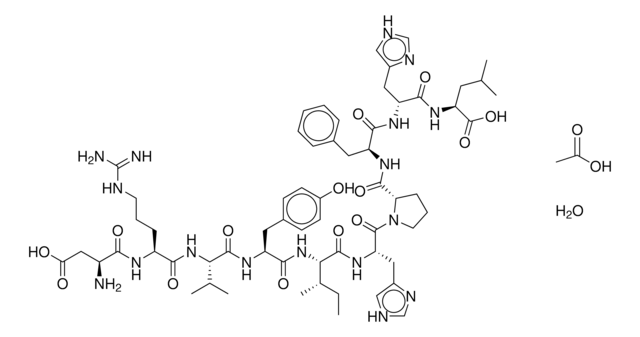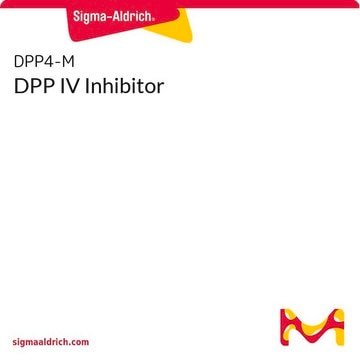S6135
Somatostatin 28
≥97% (HPLC)
Synonyme(s) :
Prosomatostatin
About This Item
Produits recommandés
Niveau de qualité
Pureté
≥97% (HPLC)
Forme
powder
Poids mol.
3148.56
Conditions de stockage
(Keep container tightly closed in a dry and well-ventilated place)
Concentration
>70% (peptide content)
Technique(s)
activity assay: suitable
Solubilité
water: 1 mg/mL, clear, colorless
Numéro d'accès UniProt
Température de stockage
−20°C
Chaîne SMILES
CSCCC(NC(=O)C(C)NC(=O)C1CCCN1C(=O)C(CC(N)=O)NC(=O)C(CO)NC(=O)C(CC(N)=O)NC(=O)C(C)NC(=O)C(N)CO)C(=O)NC(C)C(=O)N2CCCC2C(=O)NC(CCCNC(N)=N)C(=O)NC(CCC(O)=O)C(=O)NC(CCCNC(N)=N)C(=O)NC(CCCCN)C(=O)NC(C)C(=O)NCC(=O)NC3CSSCC(NC(=O)C(CO)NC(=O)C(NC(=O)C(Cc4ccccc4)NC(=O)C(NC(=O)C(CCCCN)NC(=O)C(Cc5c[nH]c6ccccc56)NC(=O)C(Cc7ccccc7)NC(=O)C(Cc8ccccc8)NC(=O)C(CC(N)=O)NC(=O)C(CCCCN)NC3=O)C(C)O)C(C)O)C(O)=O
InChI
1S/C137H207N41O39S3/c1-69(154-113(194)82(37-19-22-47-138)159-115(196)85(40-25-50-149-136(145)146)160-118(199)87(44-45-106(188)189)163-116(197)86(41-26-51-150-137(147)148)164-130(211)101-43-27-52-177(101)133(214)72(4)156-114(195)88(46-54-218-7)158-110(191)71(3)155-129(210)100-42-28-53-178(100)134(215)95(61-104(144)186)171-126(207)96(65-180)172-124(205)93(59-102(142)184)165-111(192)70(2)153-112(193)80(141)64-179)109(190)152-63-105(187)157-98-67-219-220-68-99(135(216)217)174-127(208)97(66-181)173-132(213)108(74(6)183)176-125(206)91(57-77-33-15-10-16-34-77)170-131(212)107(73(5)182)175-119(200)84(39-21-24-49-140)161-122(203)92(58-78-62-151-81-36-18-17-35-79(78)81)168-121(202)90(56-76-31-13-9-14-32-76)166-120(201)89(55-75-29-11-8-12-30-75)167-123(204)94(60-103(143)185)169-117(198)83(162-128(98)209)38-20-23-48-139/h8-18,29-36,62,69-74,80,82-101,107-108,151,179-183H,19-28,37-61,63-68,138-141H2,1-7H3,(H2,142,184)(H2,143,185)(H2,144,186)(H,152,190)(H,153,193)(H,154,194)(H,155,210)(H,156,195)(H,157,187)(H,158,191)(H,159,196)(H,160,199)(H,161,203)(H,162,209)(H,163,197)(H,164,211)(H,165,192)(H,166,201)(H,167,204)(H,168,202)(H,169,198)(H,170,212)(H,171,207)(H,172,205)(H,173,213)(H,174,208)(H,175,200)(H,176,206)(H,188,189)(H,216,217)(H4,145,146,149)(H4,147,148,150)
Clé InChI
GGYTXJNZMFRSLX-UHFFFAOYSA-N
Informations sur le gène
human ... SST(6750)
Amino Acid Sequence
Description générale
The SST gene is mapped to human chromosome 3q27.3. Both SST-14 and SST-28 are cyclic peptide.
Application
- to study the effects of somatostatin in regulating hepatic growth hormone sensitivity
- to study its effects on insulin-like growth factor-I receptor expression in the gills of Oncorhynchus mykiss (a teleost fish)
- to assess the effects of somatostatinon GH (growth hormone)-stimulated IGF-I (insulin-like growth factor-I) expression
Actions biochimiques/physiologiques
Anticorps
Produit(s) apparenté(s)
Code de la classe de stockage
11 - Combustible Solids
Classe de danger pour l'eau (WGK)
WGK 3
Point d'éclair (°F)
Not applicable
Point d'éclair (°C)
Not applicable
Équipement de protection individuelle
Eyeshields, Gloves, type N95 (US)
Certificats d'analyse (COA)
Recherchez un Certificats d'analyse (COA) en saisissant le numéro de lot du produit. Les numéros de lot figurent sur l'étiquette du produit après les mots "Lot" ou "Batch".
Déjà en possession de ce produit ?
Retrouvez la documentation relative aux produits que vous avez récemment achetés dans la Bibliothèque de documents.
Notre équipe de scientifiques dispose d'une expérience dans tous les secteurs de la recherche, notamment en sciences de la vie, science des matériaux, synthèse chimique, chromatographie, analyse et dans de nombreux autres domaines..
Contacter notre Service technique






